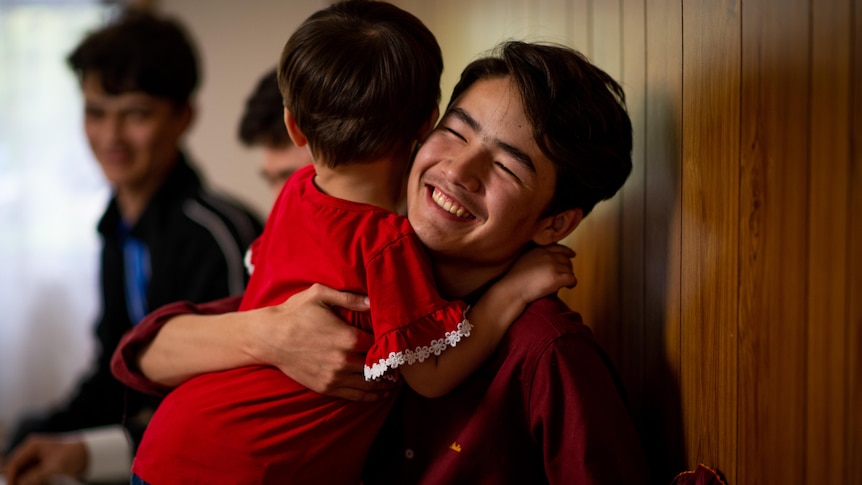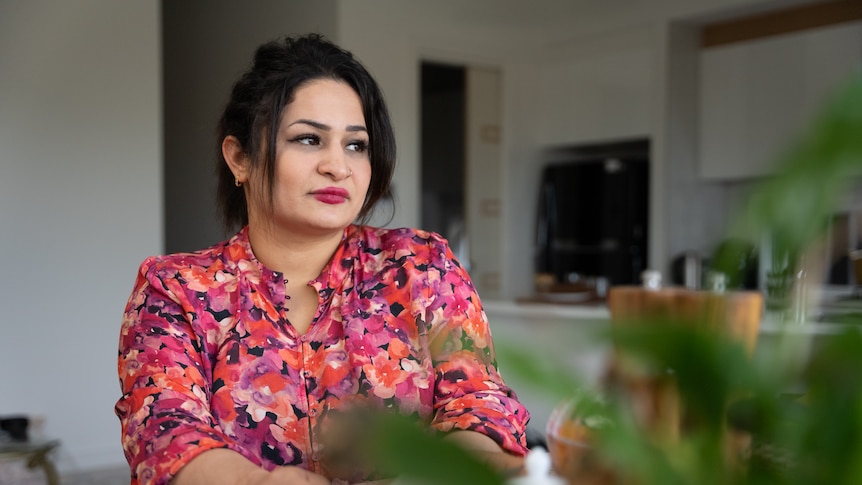A family who fled Afghanistan after their daughter was killed in a missile attack has finally been reunited in South Australia.
Key points:
- A family took the Australian government to court over a four-year delay in processing their visa applications
- Around 1,700 Afghan partner and family visas were granted in the past year
- Some of those visa applications date back to 2012
The Rezaee family had been separated for more than a decade as they waited for humanitarian visas to be processed.
Abdullah Rezaee said he was granted permanent refugee status in Australia in 2011, after he was forced to flee his homeland.
“I was working in an association and, because of that, my life was being threatened by the Taliban and I was at risk, so I couldn’t feel safe in Afghanistan, so I had to flee,” he said.
“That time was very hard for me, I was upset and sick.”
After moving to Pakistan as refugees, Abdullah’s wife, Fatima, and their surviving children applied for Australian visas in 2017.
Earlier this year, they still had received no response, so the family took the Australian government to court over the delay.
Their lawyer, Josephine Langbien, said the court case argued that the government had failed its legal responsibility to determine visa applications within a reasonable time.
“They had been waiting [more than] four years and I think anyone can agree that it is simply an unreasonable length of time to have to wait,” Ms Langbien said.
The Australian government granted the case and issued the family with permanent visas.
Weeks later the family were reunited in Adelaide.
Zamin Ali, 20, said there were tears of joy when he first saw his father.
“I was waiting for the moment of the reunion with my father. It was like a dream come true,” he said.
“It was as if I was waiting my whole life to be reunited with my father because we were apart for many years.”
Mr Ali now dreams of becoming a professional soccer player or a doctor.
His younger sister, 14-year-old Frozan, has been taking English lessons for new arrivals.
Mr Rezaee said it was “very important” that his children could go to school.
“In Pakistan and in Afghanistan they cannot go to school. They have a lot of problems,” he said.
“Now, here, they are going to school. I am very happy.”
The family’s four-year visa order is not uncommon.
Ms Langbien — who works at the Human Rights Law Center — said thousands of Afghan families remained separated while waiting for visas.
“After two decades of war, Australia owes a moral obligation to the people of Afghanistan,” she said.
“We have a responsibility to do more to help. We can do more to help.”
“We need the new government to increase its commitment to supporting families who are separated between Australia and Afghanistan and work so much faster to bring those families back together.”
The Human Rights Law Center said 211,000 Afghans have applied for humanitarian visas in Australia since the Taliban took control of Afghanistan a year ago.
Ms Langbien said more than 7,000 people from Afghanistan were currently waiting for family visas to be processed, and close to 5,000 of those have been waiting longer than two years for an answer.
“We promised additional humanitarian visas, but we know that only a few thousand of those visas have actually been issued,” she said.
Federal government figures show that, in the past year, more than 1,700 Afghan partner and family visas have been granted.
Some of these applications were lodged back in 2012.
Arif Hussein from the Refugee Advice and Casework Service said the scale of the humanitarian crisis in Afghanistan was reflected in the number of people who have sought protection from the Australian government.
“It’s important to remember [that] many of these applicants are immediate family members of those in Australia: wives, husbands and children,” he said.
“Our new government must take the opportunity for concrete action for other people from Afghanistan by committing to, and implementing, a one-off, 20,000 humanitarian intake of the most vulnerable people.”
A Department of Home Affairs spokesperson said a total of 31,500 places would be available for Afghan nationals over the next four years.
“The Australian government remains committed to supporting the Afghan community at this distressing time,” the spokesperson said.
“The department is working to ensure that visa options continue to be available to Afghan nationals, both within Afghanistan and those who have been displaced from their home country.”
.

